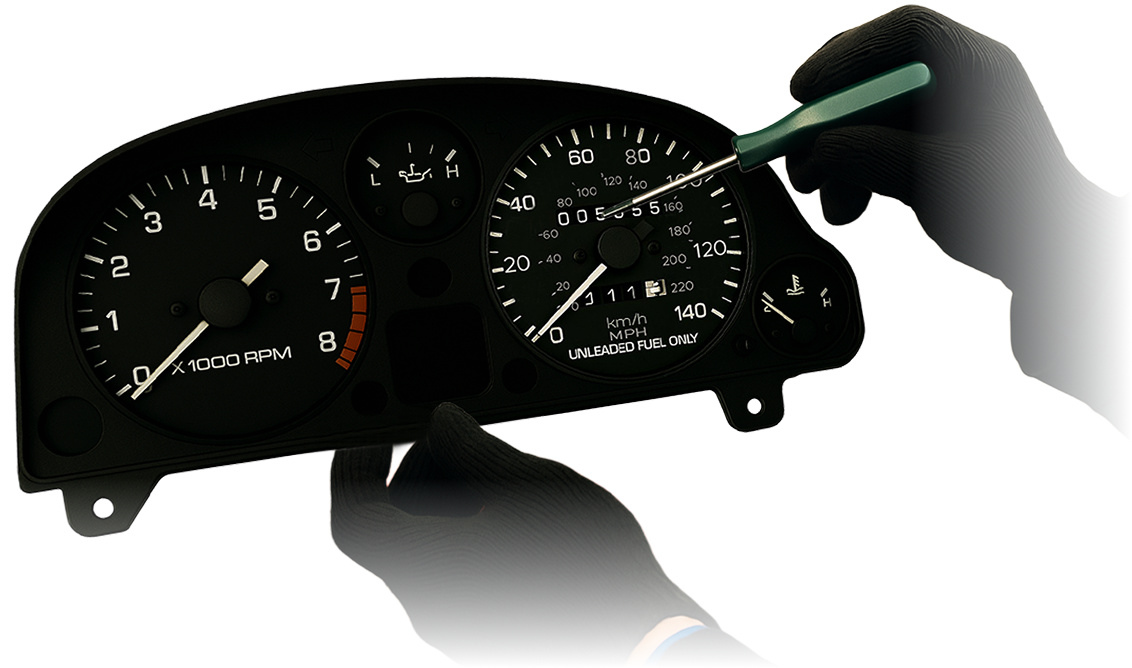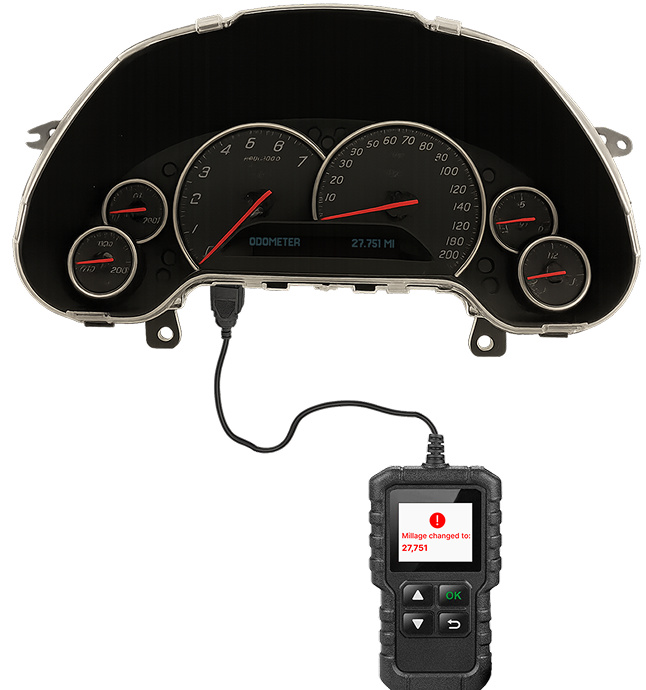Check reported vehicle mileage, detect odometer rollback fraud and uncover Total Mileage Unknown (TMU) title branding.
Where to find VIN?


Odometer fraud, which is commonly referred to as odometer rollback, is a highly deceptive and illegal practice that occurs when the mileage on a vehicle's odometer is intentionally altered to make the car appear to have fewer miles than it actually does. This form of fraud is a significant issue in the used car market, affecting both buyers and sellers. Being aware of this practice and understanding how to spot the signs of possible odometer tampering and inconsistencies in reported vehicle history report mileage records can help consumers make more informed decisions when purchasing a used vehicle.

Manual Tampering: This occurs when someone physically takes apart the gauge cluster to access the odometer and roll back the mileage. This is more common on older vehicles with a mechanical odometer.
Electronic Manipulation: Most modern vehicles are equipped with digital odometer displays and some clever safeguards to reduce the chances of odometer manipulation. However, there are specialized diagnostic tools and devices available that have been known to be misused by criminals to reset the odometer electronically.
Paperwork Fraud: Falsifying documents to hide the true mileage of the vehicle is another form of odometer fraud. It is often accompanied by one of the 2 methods mentioned above. This tactic is used to make the mileage displayed on the paperwork more believable. It is done by tampering and adjusting the mileage displayed on the odometer to closely resemble what is misrepresented on the car's title/paperwork.
According to the National Highway Traffic Safety Administration (NHTSA), odometer fraud costs consumers in the United States over $1 billion annually. These statistics highlight the widespread nature of the problem and its significant financial and safety implications.
Overpayment: Buyers typically pay more for a vehicle with lower mileage. If the odometer has been rolled back, they are essentially overpaying for a car that has more wear and tear than indicated.
Higher Maintenance Costs: Vehicles with higher mileage typically require more frequent maintenance and repairs. Buyers who are unaware of the true mileage may face unexpected and costly repairs.
Decreased Value: When the true mileage of a vehicle is revealed, its resale value can significantly decrease. In some cases, the DMV may issue a Total Mileage Unknown (TMU) branded title. This can significantly affect its resale value and make it difficult for the buyer to sell the car in the future.
Wear and Tear: Vehicles with higher mileage tend to have more issues with various critical components such as the engine, transmission, tires, and brakes. Excessive wear and tear can lead to unexpected repairs and in some cases, even compromise the safety of the vehicle. Additionally, unexpected car buyers may overlook checking a vehicle with low mileage thoroughly and may even forgo a professional pre-purchase inspection assuming the vehicle is not likely to have any underlying issues due to its low mileage.

Get a full vehicle history report before you buy!
Beyond displaying the vehicles reported mileage and identifying any odometer discrepancies a Vehicle History Report can provide detailed information about the vehicle's past such as:
Detailed reports on any accidents the vehicle has been involved in, including the severity of the accidents and the extent of the damage.
Detailed specifications about the vehicle, including its make, model, year, engine type, and more...
Crucial details about the vehicle's title, such as whether it has a clean title, salvaged title, or any other issues that may impact its value.
The vehicle's original MSRP as well as an estimation of the current market value, helping buyers and sellers determine a fair and competitive price.
Verification of the accuracy of the reported mileage to prevent odometer fraud.
Information about the vehicle's fuel efficiency, giving potential buyers insights into it's operational costs.
Reports may contain sale and lien related data such as sale dates, repossession, sale amounts, lienholder/bank names, locations and status.
Images of the vehicle pre and post accident can help aid in determining accident location and severity.
An ownership history, including the number of previous owners and the duration of each ownership.
Owners provide their unbiased opinions about the vehicle's performance, reliability and value.
Details about manufacturer recalls, indicating whether the vehicle has been subject to any recalls and if the necessary repairs have been made.
Records indicating whether the vehicle has been used as a taxi, law enforcement vehicle, rental car or for any other commercial purposes
Reports may reveal existing warranty information, coverage dates and mileage restrictions.
Recognition of any significant event that could lead the insurance company to declare the car a total loss and assign specific designations to the vehicle title, including junk or salvage, rebuilt, theft recovery, TMU (True Mileage Unknown), and more...
Request a professional pre-purchase vehicle inspection
A pre-purchase vehicle inspection conducted by a trusted, professional auto technician may uncover issues never reported to any agency and can give a more accurate understanding of the vehicles current condition. It may also help assess the vehicles value and anticipate any future repairs.
Enter VIN & Search
Review Preliminary Results
Register & Download Report
Unlike other vehicle history report providers, VinCheckUp.com offers users comprehensive, real-time Federal Gov't Title & Total Loss data & more, at an affordable price. We use advanced, powerful tools that allow you to access the National Vehicle Title Information System as well as additional record sources to check an automobile's title history, including its reported odometer readings(s). You can also determine whether the used vehicle has ever been junked, salvaged or flooded.
Odometer history shows recorded mileage over time to help detect rollbacks, tampering or inconsistent readings.
Run a VIN check or vehicle history report to view mileage recorded during inspections, services and registrations.
Yes, if mileage readings drop or appear inconsistent, the report may flag possible odometer rollback or tampering.
It ensures the vehicle's mileage is accurate, helping you avoid fraud and overpaying for a high-mileage vehicle.
Some service centers and inspection stations report mileage, which may help verify true vehicle usage. However, not all service centers participate in full reporting, depending on the local regulations and the type of service facility as well as the reporting agents. Some events may not be recorded or reported.
Yes, digital odometers can still be rolled back or tampered with using specialized tools or software, which is why checking a vehicle's odometer history through a VIN report is important for detecting mileage fraud.